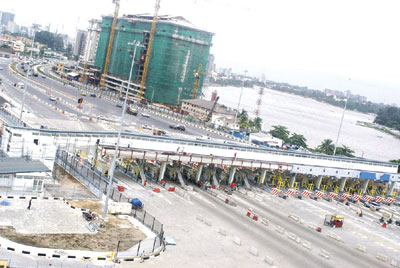The Socio-Economic Rights and Accountability Project (SERAP) has described the recent toll charges increase at the Lekki-Epe Expressway and Lekki-Ikoyi Link Bridge toll gates by the Lekki Concession Company (LCC) as “unfair and discriminatory”.

In a statement endorsed by the group’s executive director, Adetokunbo Mumuni, and made available to EnviroNews on Sunday, February 11, 2018, SERAP urged Governor Akinwunmi Ambode to take immediate steps to reverse the charges “if the Lagos State Government is not to run the risk of undermining the public interests, democratic values and accountability, and opportunities for participation.”
The organisation stated, “It’s time for Ambode to ensure and maintain a balance between the needs of the citizens and residents of Lagos State and the Lekki Concession Company. The authorities should respect and protect the right of protesters to demonstrate against the hike in toll charges and to voice their opinion. International human rights treaties ratified by Nigeria and the country´s own constitution obligate the government to safeguard the rights of freedom of expression, association and peaceful assembly.”
The new rates for the toll charges at the Lekki-Epe Expressway and Lekki-Ikoyi Link Bridge toll gates were implemented on February 1 by the LCC, managers of the road.
But SERAP declared in the statement: “This latest increase in toll charges at the Lekki-Epe Expressway and Lekki-Ikoyi Link Bridge toll gates is unacceptable, as it conflicts with the goals and commitment of the Lagos State Government to provide basic public services to citizens and residents. It seems the agreement between the Lagos State Government and the Lekki Concession Company is no longer serving the needs of citizens and residents.”
According to the group, “In the face of rising poverty and economic inequalities across the country, the Lagos State Government should be considering eliminating toll charges rather than allowing the Lekki Concession Company to get away with overcharging citizens and residents and prioritising profits over the public interests. Unless the situation is satisfactorily resolved in the public interests, the government runs the risk of being viewed as beholden to special interests and out of touch with the public good.”
The statement further reads: “The hike shows how profit motive can conflict with public motive. Accountability principles require the government to ensure that the activities of the Lekki Concession Company align with the policies and activities of governance, and that the Company is not allowed to exploit its monopoly position to charge excessive rates.
“It is the duty of the Lagos State Government, as custodian of the public trust, to take the public interests into account in assessing the activities of the Lekki Concession Company. The government is further obligated to prevent unnecessary and unjustified harm to the public trust and interests.
“Both ‘pre-decision accountability’ in the form of consultation with citizens, residents and other stakeholders, and ‘post-decision accountability’ in the form of taking corrective measures to redress the apparent injustice to those that might be affected by the hike are key democratic and governance values.
“Citizens cannot be mere recipients or purchasers of government services; they must also participate in the act of governance itself. The shift from a participatory role to a consumer role changes the role of individuals vis-a-vis their government from one of citizens to one of consumers. This itself erodes the ideals of a democratic society.
“States contravene their human rights obligations when they fail to take appropriate measures or to exercise due diligence to prevent, punish, investigate or redress the harm caused by acts by private persons or entities.
“At the Admiralty Circle Plaza (Lekki-Epe expressway), cars now pay N200 from N120; sports utility vehicles (SUV) now pay N250 from N150; while commercial buses now pay N150 from N80. Motorcycles now pay N100. At the Lekki-Ikoyi Link Bridge, saloon cars now pay N300 from N250; sports utility vehicles (SUV), mini vans, and light trucks now pay N400 from N300. Motorcycles will now pay N200.”
